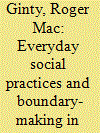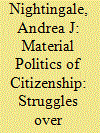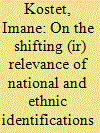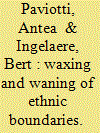|
|
|
Sort Order |
|
|
|
Items / Page
|
|
|
|
|
|
|
| Srl | Item |
| 1 |
ID:
153697


|
|
|
|
|
| Summary/Abstract |
Based on empirical evidence and conceptual scoping, this article builds a typology of everyday social practices in a deeply divided society. The typology distinguishes between moderating and non-moderating practices relating to boundaries. Based on a case study of contemporary Lebanon, it describes how boundary making and maintaining are the stuff of everyday life in deeply divided societies. But it also describes how the society under study also contains much evidence of fluidity and permeability in relation to boundaries. Many of these instances of boundary crossing do not threaten the meta politico-religious boundary, but they do compel us to re-evaluate views of deeply divided societies as comprised of homogenous and uncompromising blocs.
|
|
|
|
|
|
|
|
|
|
|
|
|
|
|
|
| 2 |
ID:
168821


|
|
|
|
|
| Summary/Abstract |
Examining the boundaries of state–society–citizen–environment after the federal restructuring in Nepal, we ask how do people claim authority or citizenship rights? We theorise state power through the socio-environmental state framework as a set of socio-natural relations in the making, formed by struggles over authority, recognition and environment. Using qualitative data from Barpak, the epicentre of the 2015 earthquake, we capture the politics of natural resource governance that (re)emerged during earthquake reconstruction and local-level elections, illustrating how control over resources is negotiated, disputed, and inscribed in law (land titles and water sources) and landscapes (water sources, earthquake resettlement area, an open-air museum).
|
|
|
|
|
|
|
|
|
|
|
|
|
|
|
|
| 3 |
ID:
190767


|
|
|
|
|
| Summary/Abstract |
Based on three rounds of in-depth interviews, this article discusses the various ways in which children negotiate ethnic and national identities in a majority-minority city. I examine which identity labels children identify with, which relevance they attach to those labels, how they define these inclusively or exclusively and what these labels reveal about their senses of belonging. Children negotiate identity in myriad and creative ways and, while doing so, challenge public and political discourses by creating inclusive categories which transcend ethnic or national boundaries. I further show how, approximately 20 months after the first research round, the children retrospectively reflect on their self-identifications, may alter their initially chosen identity labels, and critically question the importance they once attached to those identities. The results contribute to a deeper understanding of children’s reflexivity and agency while dealing with their identity in a super-diverse environment.
|
|
|
|
|
|
|
|
|
|
|
|
|
|
|
|
| 4 |
ID:
191859


|
|
|
|
|
| Summary/Abstract |
Violence based on identity constructs reinforces the experience of ethnic boundaries as felt distance between in-groups and out-groups. But what makes such an experience of rigid ethnic boundaries fade or disappear, if anything? We examined this in Burundi, a country characterised by repeated episodes of violence between Hutu and Tutsi since independence. We analysed the waxing and waning of ethnic boundaries through the (life) stories of 202 individuals collected through an iterative research process in two rural villages that were seriously touched by (ethnic) violence. Rigid boundaries between ethnic in- and out-group appeared to fade through non-violent interactions; when categorisations other than ethnic emerged; and when awareness of interstitiality, being in-between salient groups, contested the relevance and meaning of the ethnic boundary as such. These insights invite us to bring in multiple temporalities and identities when aiming to understand legacies of violence in conflict-affected societies such as Burundi. This would allow us to avoid treating groups as substantial entities, which reinforces boundaries between in-groups and out-groups.
|
|
|
|
|
|
|
|
|
|
|
|
|
|
|
|
|
|
|
|
|